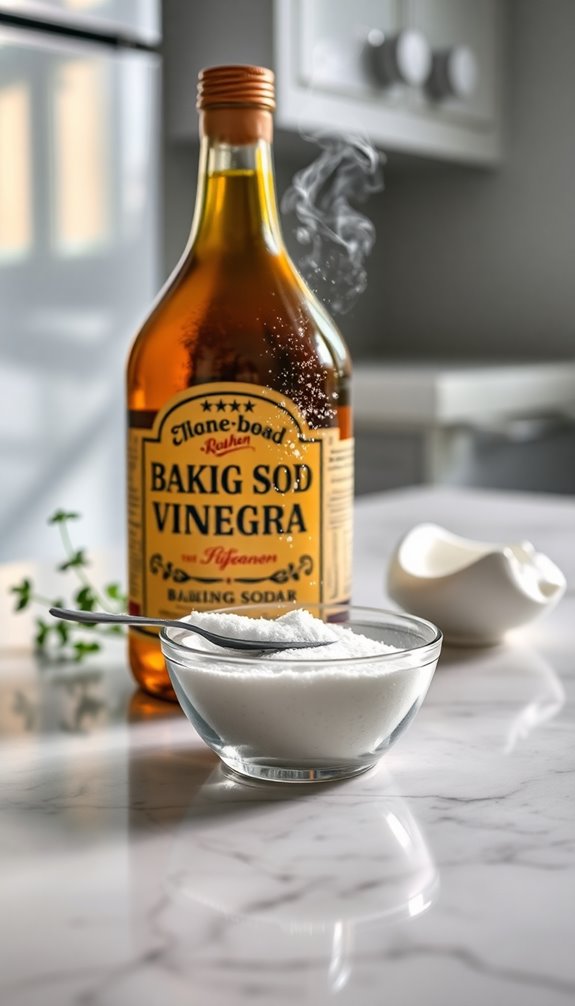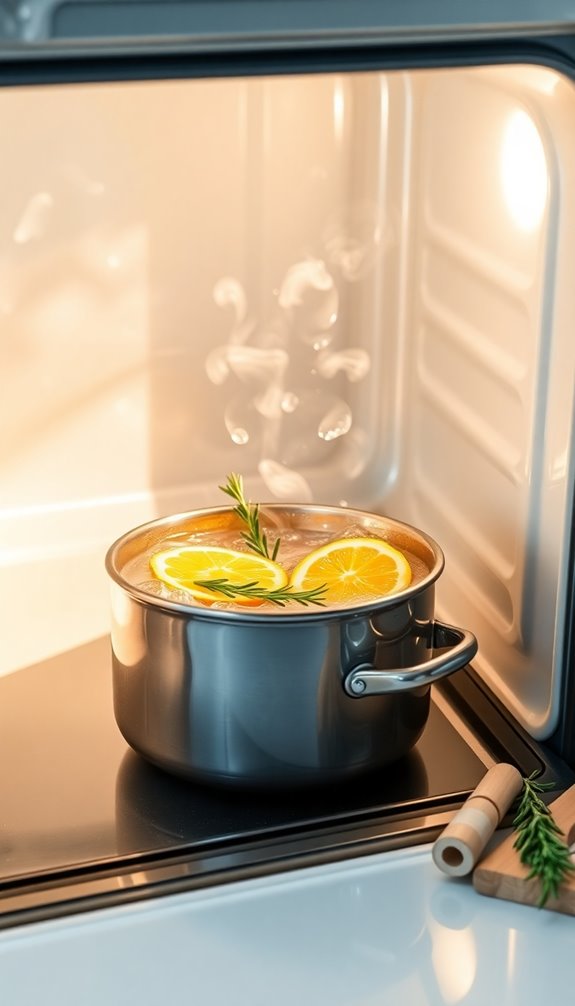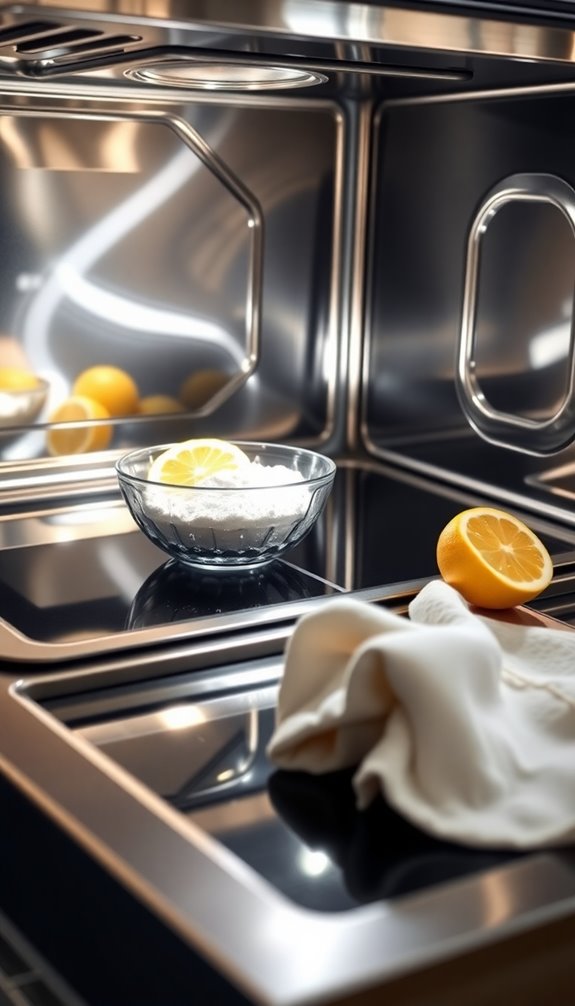Cleaning your oven naturally is simple and safe. Start by creating a paste with ½ cup of baking soda and water, applying it to tough spots. Then, spray a mixture of equal parts vinegar and water to activate a foaming action that lifts grime. For added freshness, use lemon juice to cut through grease and neutralize odors. Consider steam cleaning for tough stains, too. Don't forget to use old toothbrushes or plastic scrapers for those hard-to-reach areas. With regular maintenance, your oven will stay in top shape. There's plenty of tips ahead to keep your cooking space sparkling clean!
Overview of Oven Cleaning
When it comes to maintaining a clean kitchen, understanding oven cleaning is essential. You might encounter common issues like burnt-on food, splattered grease, and dried food residues that seem impossible to remove.
While self-cleaning ovens offer a quick fix, they can cause fast fuse burnouts and raise air quality concerns due to their high-temperature cycles. Additionally, overuse of harsh chemicals can damage oven surfaces and release harmful fumes during cooking. Regular cleaning prevents grime buildup and maintains oven hygiene, making your future cleaning efforts much easier and more effective.
Using natural cleaning methods is a great way to tackle those tough messes without the harsh chemicals typically found in commercial cleaners. For instance, baking soda and vinegar work wonders together.
Simply sprinkle baking soda on the dirty areas, spray vinegar, and let it sit. This chemical-free approach is particularly beneficial for households with pets, ensuring a safer environment for everyone. Additionally, opting for natural cleaning methods not only reduces exposure to harmful toxins but also promotes a healthier home environment.
Natural Cleaning Methods
Natural cleaning methods offer effective solutions for keeping your oven spotless without relying on harsh chemicals. One of the best natural cleaning solutions is baking soda. You can create a paste by mixing ½ cup of baking soda with water and apply it to the oven surfaces. Let it sit for at least two hours or overnight to tackle tough spots. When you're ready to clean your oven, simply wipe it away, and you'll notice a significant reduction in baked-on food.
For an added boost, consider using vinegar. When you apply it after the baking soda, vinegar will react and produce a foaming action that helps lift grime away. Additionally, using baking soda paste is an effective technique for tough grime removal, similar to the baking soda paste method used for cleaning scorched pots. Regular use of these natural cleaners promotes sustainable cleaning habits that are safe for your family and the environment.
If unpleasant odors linger in your oven, lemon juice is a fantastic natural degreaser that can eliminate odors and stains, leaving a fresh scent behind.
Baking Soda and Vinegar Solutions

Using baking soda and vinegar together creates a powerful cleaning duo that can tackle even the toughest oven grime.
Start by mixing ½ cup of baking soda with water to create a paste. Apply the baking soda generously to the surfaces of your oven, letting it sit for at least two hours or overnight for the best results. This will help loosen stubborn stains and residue. Regular use of these natural ingredients can promote eco-friendly practices that are beneficial for your home and the environment. Additionally, using natural cleaning agents such as baking soda and vinegar helps avoid the use of harsh chemicals.
Once the waiting period is over, it's time to activate your cleaning solution. Spray diluted white vinegar—mix equal parts vinegar and water—over the baking soda paste. You'll notice a foaming action that works wonders in lifting grime.
For an even easier way to clean, combine equal parts white vinegar, dish soap, and water in a spray bottle. Spray this mixture inside your oven and let it sit for a few hours before wiping it clean.
After the cleaning process, don't forget to remove the baking soda. Regular use of these baking soda and vinegar solutions guarantees a safer, chemical-free cleaning method that's effective and doesn't compromise your indoor air quality. Additionally, ensuring a clean surface for applying cleaning solutions is crucial for effective cleaning.
Enjoy your sparkling clean oven!
Lemon-Based Cleaning Techniques
Lemon juice is a powerhouse for cleaning your oven, thanks to its natural acidity and fresh scent. One effective method is to cut a lemon in half and sprinkle baking soda on the fleshy side. This creates a fantastic scrubbing tool that utilizes the lemon's acidity to break down grease and stains.
When mixed with lemon juice, baking soda forms a powerful cleaner that not only eliminates odors but also leaves behind a delightful scent. In addition, using eco-friendly alternatives such as baking soda and lemon juice reduces reliance on harsh chemicals, promoting a healthier kitchen environment.
For tougher grime, consider steam cleaning with lemon. Boil water with lemon halves, allowing the steam to penetrate and loosen stubborn grease, making it easier to wipe away afterward. This method also harnesses the natural antibacterial properties of lemon, making it a safe choice in food preparation areas.
Using lemon-based cleaning techniques is an eco-friendly option that minimizes your exposure to harsh chemicals typically found in commercial cleaners.
By opting for these chemical-free methods, you're not just cleaning your oven; you're also contributing to a healthier home environment.
Steam Cleaning Methods

Steam cleaning your oven is an effective way to tackle tough grime and grease without resorting to harsh chemicals. One popular steam cleaning method involves boiling a mixture of water and vinegar in a pot.
Place this pot in your oven for 45-60 minutes to soften built-up dirt. The steam generated will loosen stubborn residues, making it easier to wipe away afterward.
Alternatively, you can boil water with lemon juice and lemon halves. This not only helps break down tough grime but also leaves your oven smelling fresh.
After steaming, it's essential to wipe down the surfaces with a soapy cloth to remove any loosened debris. This final step guarantees you're not just sanitizing your oven but also leaving it sparkling clean.
Steam cleaning methods are a time-efficient option compared to traditional cleaning techniques. You'll find that not only does it save you time, but it also greatly reduces drying time, allowing you to get back to cooking quicker.
Embrace these natural cleaning methods to maintain a clean and healthy cooking environment without compromising on safety.
Tools for Effective Cleaning
After you've harnessed the power of steam cleaning, having the right tools on hand makes a significant difference in achieving a spotless oven. Each tool plays an important role in enhancing your cleaning process while keeping it chemical-free.
Here's what you'll need:
- Old toothbrush: Perfect for reaching tight corners and crevices, allowing you to scrub hard-to-reach areas effectively.
- Plastic scraper: This tool lifts stubborn grime without scratching surfaces, making it fundamental for cleaning your oven.
- Steam cleaner: Utilizing this enhances your cleaning process by sanitizing and loosening tough stains with high-temperature steam.
- Microfiber cloths: These guarantee a streak-free finish when wiping down surfaces after cleaning, without leaving lint behind.
When combined with a baking soda mixture, these tools can tackle even the toughest messes in your oven, including those in commercial ovens.
Regular Maintenance Practices

To keep your oven in top shape, regular maintenance practices are vital. Start by wiping down oven surfaces after each use. This simple step prevents grease and food buildup, making it easier to clean an oven later on.
If you spill something, address it immediately; quick daily clean-ups can save you from extensive cleaning sessions down the line.
Every few months, schedule a deep cleaning, especially if you use your oven frequently. This will help maintain its performance and longevity. Consider using protective liners in the oven to catch spills and drips, which also reduces the need for frequent deep cleaning.
Don't forget about the oven racks; they can accumulate dirt too. Clean them along with the rest of the oven to guarantee ideal cooking conditions.
It's also important to educate everyone in your household on proper oven usage. This minimizes messes and encourages participation in routine maintenance tasks.
Odor Absorption Techniques
Unpleasant odors can linger in your oven, but effective techniques can help you tackle them. Using natural odor absorbers is a great way to neutralize those smells without harsh chemicals.
Here are some simple cleaning tips to freshen up your oven:
- Baking Soda: Place an open container in the oven to absorb and neutralize odors effectively.
- Vinegar and Water: Mix these two and spray the solution inside your oven. Vinegar works wonders to neutralize odor-causing particles.
- Lemon Juice: Put a bowl of lemon juice in the oven overnight. Its acidity helps freshen the air and eliminate lingering smells.
- Activated Charcoal: Known for its high adsorption capacity, activated charcoal is another excellent choice for absorbing various odors.
Additionally, you can use used coffee grounds as a natural odor absorber. Just place them in the oven overnight, and they'll leave behind a subtle coffee scent.
Incorporating these techniques into your cleaning routine can keep your oven smelling fresh and inviting. Give them a try, and enjoy a cleaner, odor-free cooking space!
Conclusion
Cleaning your oven doesn't have to be a chore filled with harsh chemicals. Just like a gardener nurturing plants with natural fertilizers, you can nurture your oven back to its sparkling best using simple ingredients like baking soda and vinegar. With consistent care and the right techniques, your oven will shine like a freshly bloomed flower, ready to create delicious meals. Embrace these natural methods, and your kitchen will thank you, both in cleanliness and in the delightful aromas of your cooking!